Did you know?
62years 7months 23days
Length of life
170 +/– cm
Height
1861-1903 (42 years)
Creative period
200+
Number of opuses written in total
186
Number of surviving completed opuses
400+/–
Number of surviving completed individual works
3½ date (cca 85 hours)
Total duration of all surviving works
1500+/–
Number of surviving items of correspondence written by Dvořák
117
Number of appearances as conductor
Dvořák the politician
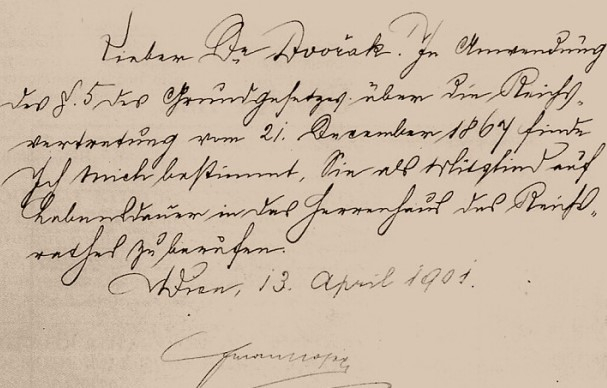
In 1901 the Austrian government appointed Antonín Dvořák and Jaroslav Vrchlický a life members of the Upper House of Parliament. This act was one of the gestures through which the emperor wished to demonstrate his friendly persuasion towards the Czech nation. For Dvořák, given his scant interest in official Austrian policy, this was a purely formal honour. His attendance in the Upper House in Vienna was thus restricted merely to a single visit (14 May 1901) when, together with Vrchlicky, he presented himself to take an oath. During the ceremony and the following parliamentary assembly Dvořák was said to have appeared considerably ill at ease; he managed to sit through a session where members voted on some economic agreement which he knew nothing about, and it was only after the session that he expressed any satisfaction. He apparently came out of the hall and announced to Czech journalists: “Well, we thrashed it all out in there!” Then he turned to his wife, who had accompanied him to Vienna, showed her a bundle of official pencils that had been set out on the members’ tables, and declared: “Anna, look, these will come in useful when I’m composing!” Thus ended Antonin Dvořák’s “political duties” in the Upper House.
Dvořák in space
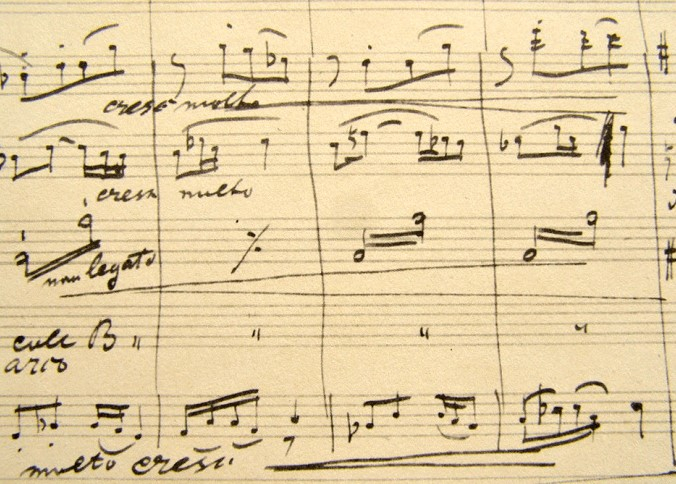
Man’s first flight to the Moon took place on 20 July 1969. The Apollo 11 spacecraft landed in the Sea of Tranquility and remained on the Moon for 21 hours and 36 minutes. The two astronauts aboard were Buzz Aldrin and Neil Armstrong. According to the traditional interpretation, although never corroborated by the participants themselves, one of them played a recording of Dvorak’s New World Symphony as he stepped out onto the lunar surface. If this was indeed the case, the composer’s music symbolically accompanied humanity on its first important journey into the universe.
From the memoirs of cousin
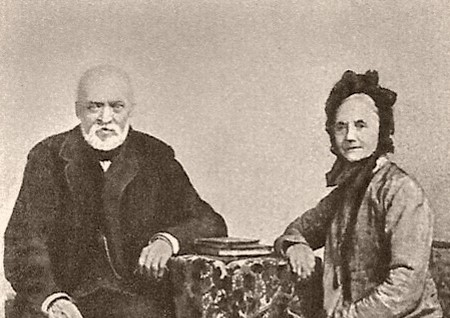
For many years (until the year 1873, when he got married) Dvorak lived in Prague with his aunt Josefina Duskova on Karlovo namesti. His cousin Anna Duskova wrote about this period, stating:
“Antonin would take breakfast with us, he went to the Zpevacek pub near the National Theatre for lunch, and he went there for dinner as well. My mother did his washing for him. When the plum season came around he would ask if she would make him lunch, and I can still picture my mother counting out thirty plum dumplings for Antonin; there was never anything left on his plate. When we moved to a larger flat in the back part of the house, he had a piano in his room which he had on loan; there was a table opposite the piano, behind which was a bed. He often started composing as soon as he woke up. He would first tap out a musical idea on his quilt with his fingers. If he was writing at the table, he would hold the quill between his teeth and finger his coat as if he were playing the piano, or he would tap out the tune on his legs. Then he would turn to the piano, play something through and sing softly to himself as he did so. Often I would sneak into the room and listen. He would stare fixedly at me, whistle to himself softly, but he probably didn’t know I was even there!” [...] “He never had any affairs; the family used to say that he was afraid of women. He would sometimes say: Now there’s a pretty girl! But that’s where it ended.”
Agoraphobia
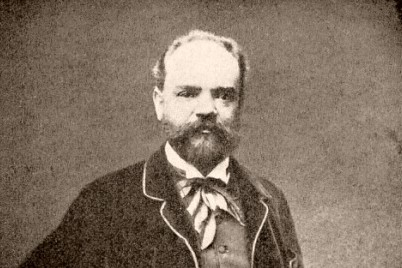
According to Dvorak’s contemporaries, the composer suffered from agoraphobia – he hated open spaces, town squares, busy streets and so on. Towards the end of his life this disorder became more acute, and his students sometimes had to accompany him on his way home from the Conservatoire.
Trains
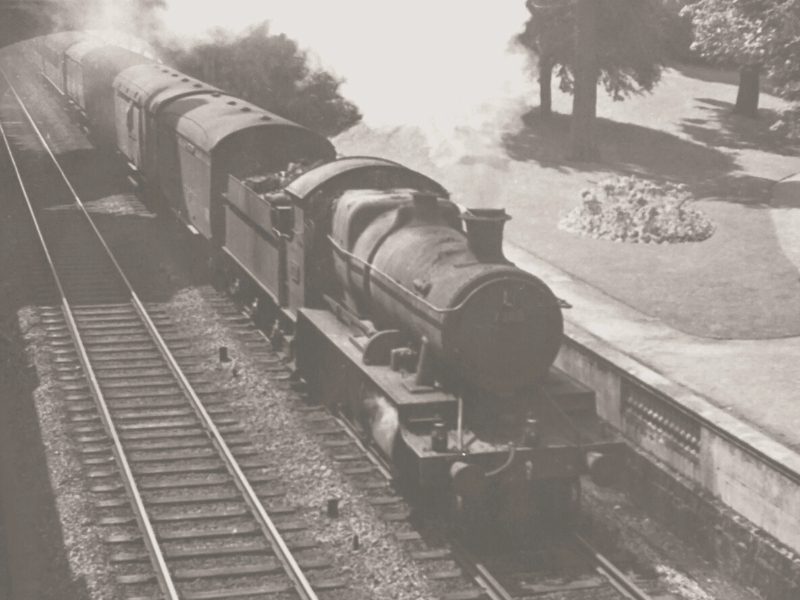
One of the oft-cited facts about the composer’s private life is his love of trains, probably fostered in his early childhood when he witnessed the construction of the railway track passing through Nelahozeves. Perhaps behind this profound interest in what was then the ultimate in technological advancement lay his fascination for flawless complex machinery, itself reminiscent of the intricate structure of the symphonic work. This is clearly reflected in the familiar quotation: “I’d give all my symphonies if I could have invented the locomotive!” Dvorak’s interest in everything associated with the railways occasionally bordered on the obsessive. He would make detailed records of the express trains travelling from Prague to Vienna, and his customary early morning ritual entailed a walk above the tunnel through which trains would exit from Prague’s main station.
Before his trips abroad Dvorak would always study the timetables carefully, combining various connections so that journeys involving several changes would take up as little time as possible. At the stations he would chat to the engine drivers, thus keeping himself up-to-date with all the technical innovations. During his time in New York, his walks to the train station, which was too far away from where he was staying, were replaced by visits to the port, and it wasn’t long before he knew exactly which ship would be conveying his letters to his children in Europe.
Dvorak once asked his student at the Conservatoire and future son-in-law, Josef Suk, to get up early and go to the station to note down the number of the engine of the Vienna express train as it came out of the station tunnel. Suk hoped to make an impression on the maestro, so he set his alarm clock and, equipped with opera glasses, he set off in the morning, heading for the top of the tunnel. After the train had passed by, he ran to Dvorak’s flat in Zitna street to show him the number he had written down. But the composer only laughed at him: instead of the engine number, Suk – ignorant of such matters – had written down the number of the tender at the back of the train...
Three call-ups
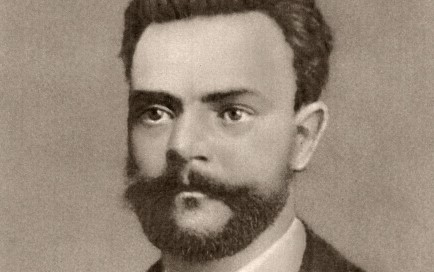
As far as we are aware, Antonin Dvorak presented himself at his local recruiting station on three occasions, in the years 1862, 1863 and 1864. The recruitment centre was located in Slany, under whose jurisdiction the composer’s birthplace Nelahozeves fell. For reasons unknown, however, Dvorak was never recruited.
Pigeons
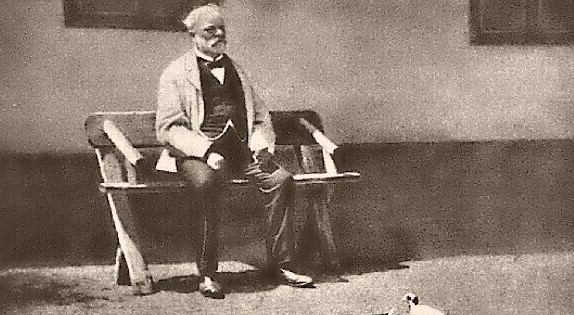
During the holidays spent at his summer residence in Vysoka, Dvorak’s main hobby was keeping pigeons. He didn’t specialise in particular breeds, but instead endeavoured to keep various types in his pigeon loft. When he was in Prague or abroad, he maintained a lively correspondence with the Vysoka miner Jan Hodik, to whom he had entrusted the management of his house and garden; he would send him a list of instructions in order that the pigeons received the best care possible. The composer came by English pouter pigeons and wig pigeons in an unusual way. One of his concerts in England, where he was conducting his own works, was attended by members of the British royal family. During the interval one of the dignitaries asked Anna Dvorakova what her husband was most fond of, since the queen herself wished to know. Anna stated that he was extremely devoted to breeding pigeons. Shortly after arriving back home Dvorak received a royal consignment of two braces of English pouter pigeons and four braces of wig pigeons.
Excerpt from Dvorak’s letter to his friend Antonin Rus:
“Please be so kind as to ask Mrs Hovorkova about those pigeons. I do need them now. One male (modena) died during the night and I really need another one. If you don’t know much about pigeons, the modena usually has wings of a different colour from its body, with similar colours around its head and neck, but its main distinguishing feature is its tail, which goes up at the back like a hen’s. If I could have that brace of beautiful modena pigeons Mrs H promised me, I would be so grateful.”
Smoking
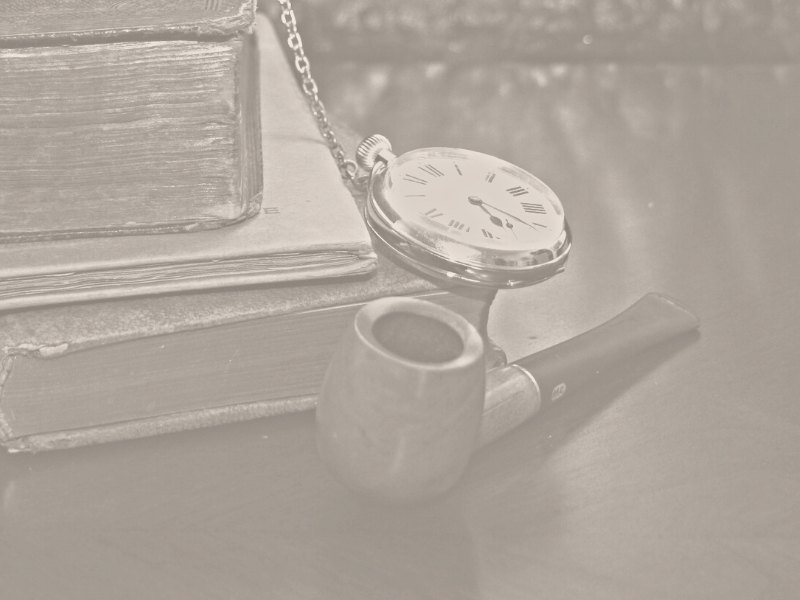
Dvorak enjoyed smoking, and he often smoked, preferably a pipe. But his wife Anna would drive him out of the flat if he lit up his pipe, so he preferred to smoke cigarettes. The composer is known for an anecdotal remark he addressed to one of his students: “You don’t smoke? Then you’ll never be a composer. All composers have to smoke!”
Forged certificate of apprecticeship
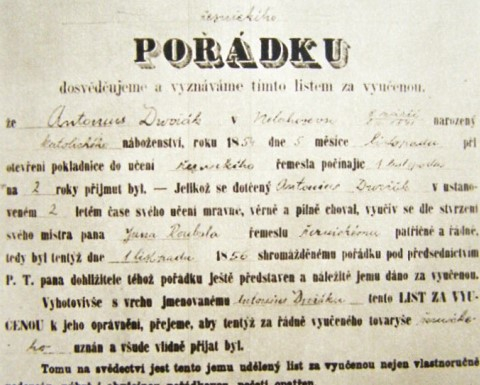
For more than one hundred years after Dvorak’s death it was thought that the composer trained as a butcher during his youth. Earlier literature on Dvorak presents this fact and during the 1930s it was even supported by the apparent discovery of a certificate of apprenticeship which turned up in a private collection. The document was photographed and reproduced, but then it vanished just as mysteriously as it had appeared. Gradually, however, a series of circumstances came to light which led scholars to question the validity of the document: Dvorak’s name does not appear on the list of apprentices in Zlonice from that time; there is no mention of a master butcher Roubal – whose signature is entered on Dvorak’s certificate of apprenticeship – among the names of Zlonice tradesmen; the handwriting of the subsequent text is completely different etc. Today the misplaced document is regarded as an obvious forgery, probably made using a blank form already signed in advance by three masters of the Zlonice builders’ (not butchers’) guild.
Composing elsewhere
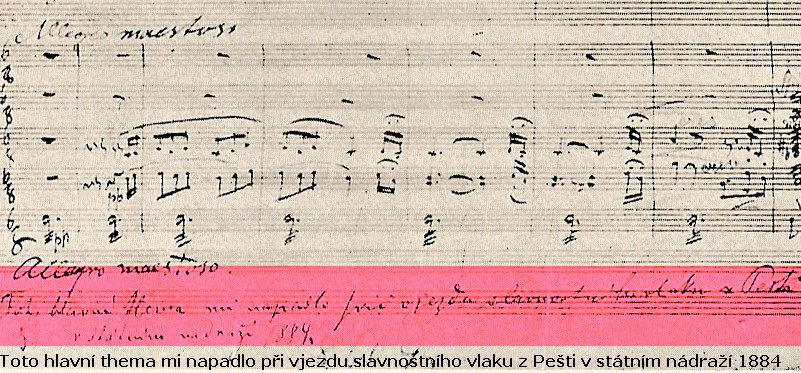
Dvorak was in the habit of getting up very early (even around five in the morning) and, after his walk, he would continue with his composition work. Nevertheless, it often happened that inspiration would strike him in highly unusual environments wholly unsuitable for focused work. For instance, the main theme of the first movement of Symphony No. 7 came to him at the train station, when the ceremonial train came in from Budapest (see reproduction on the left, which reads: “This main theme occurred to me upon the arrival at the station of the ceremonial train from Pest in 1884.”). He wrote the eighth part of his Requiem (Lacrimosa) on a train bound for London in May 1890.
Various ideas for his famous American Quartet (No. 12 in F major) occurred to him while on walks down to Turkey River during his summer holiday in Spillville in 1893; whenever he came up with a motif, he would make a note of it on the cuff of his shirt sleeve. Towards the end of his time in the United States Dvorak would often visit the Saale docked in the Port of New York. Since he had already purchased boarding cards for the ship several months in advance, as was customary at that time he was allowed on board whenever the ship anchored in the harbour. At least, in this way, the composer felt somewhat closer to his homeland, which he greatly missed during the last stage of his sojourn in America. It was here that he also worked on his celebrated Cello Concerto in B minor. And the score of the orchestral version of Slavonic Dance No. 7 was written on 1 August 1878 at the top of mount Spicak during a summer excursion with friends in the Sumava mountains.